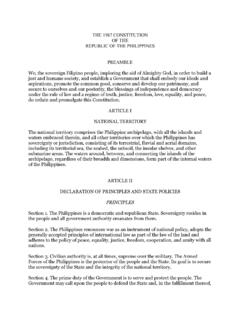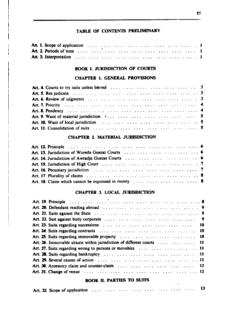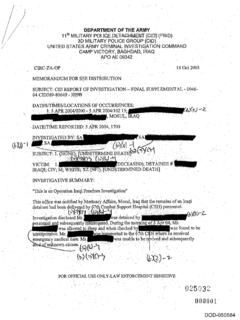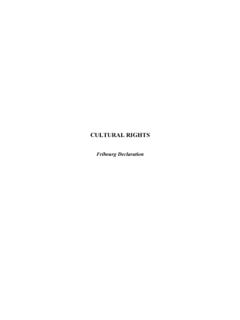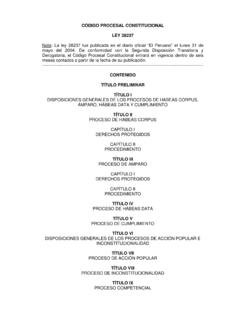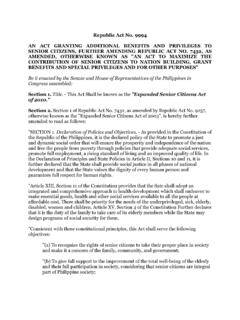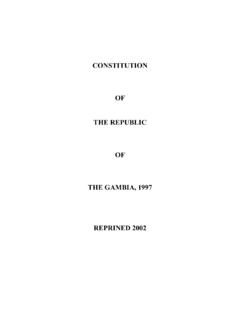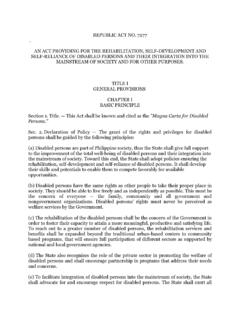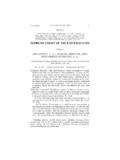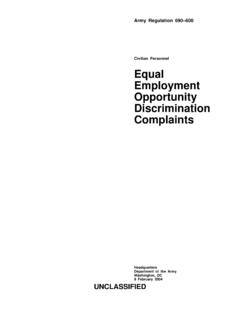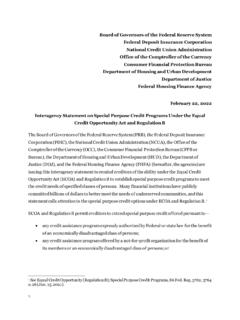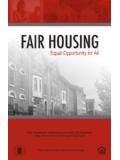Transcription of Republic of the Philippines SUPREME COURT
1 Republic of the Philippines SUPREME COURT Manila EN BANC No. L-7995 May 31, 1957 LAO H. ICHONG, in his own behalf and in behalf of other alien residents, corporations and partnerships adversely affected. by Republic Act No. 1180, petitioner, vs. JAIME HERNANDEZ, Secretary of Finance, and MARCELINO SARMIENTO, City Treasurer of Manila, respondents. Ozaeta, Lichauco and Picazo and Sycip, Quisumbing, Salazar and Associates for petitioner. Office of the Solicitor General Ambrosio Padilla and Solicitor Pacifico P. de Castro for respondent Secretary of Finance. City Fiscal Eugenio Angeles and Assistant City Fiscal Eulogio S. Serrano for respondent City Treasurer. Dionisio Reyes as Amicus Curiae. Marcial G. Mendiola as Amicus Curiae. Emiliano R. Navarro as Amicus Curiae. LABRADOR, J.: I. The case and issue, in general This COURT has before it the delicate task of passing upon the validity and constitutionality of a legislative enactment, fundamental and far-reaching in significance.
2 The enactment poses questions of due process, police power and equal protection of the laws. It also poses an important issue of fact, that is whether the conditions which the disputed law purports to remedy really or actually exist. Admittedly springing from a deep, militant, and positive nationalistic impulse, the law purports to protect citizen and country from the alien retailer. Through it, and within the field of economy it regulates, Congress attempts to translate national aspirations for economic independence and national security, rooted in the drive and urge for national survival and welfare, into a concrete and tangible measures designed to free the national retailer from the competing dominance of the alien, so that the country and the nation may be free from a supposed economic dependence and bondage. Do the facts and circumstances justify the enactment? II. Pertinent provisions of Republic Act No. 1180 Republic Act No.
3 1180 is entitled "An Act to Regulate the Retail Business." In effect it nationalizes the retail trade business. The main provisions of the Act are: (1) a prohibition against persons, not citizens of the Philippines , and against associations, partnerships, or corporations the capital of which are not wholly owned by citizens of the Philippines , from engaging directly or indirectly in the retail trade; (2) an exception from the above prohibition in favor of aliens actually engaged in said business on May 15, 1954, who are allowed to continue to engaged therein, unless their licenses are forfeited in accordance with the law, until their death or voluntary retirement in case of natural persons, and for ten years after the approval of the Act or until the expiration of term in case of juridical persons; (3) an exception therefrom in favor of citizens and juridical entities of the United States; (4) a provision for the forfeiture of licenses (to engage in the retail business) for violation of the laws on nationalization, control weights and measures and labor and other laws relating to trade, commerce and industry; (5) a prohibition against the establishment or opening by aliens actually engaged in the retail business of additional stores or branches of retail business, (6) a provision requiring aliens actually engaged in the retail business to present for registration with the proper authorities a verified statement concerning their businesses, giving, among other matters, the nature of the business, their assets and liabilities and their offices and principal offices of judicial entities; and (7) a provision allowing the heirs of aliens now engaged in the retail business who die, to continue such business for a period of six months for purposes of liquidation.
4 III. Grounds upon which petition is based-Answer thereto Petitioner, for and in his own behalf and on behalf of other alien residents corporations and partnerships adversely affected by the provisions of Republic Act. No. 1180, brought this action to obtain a judicial declaration that said Act is unconstitutional, and to enjoin the Secretary of Finance and all other persons acting under him, particularly city and municipal treasurers, from enforcing its provisions. Petitioner attacks the constitutionality of the Act, contending that: (1) it denies to alien residents the equal protection of the laws and deprives of their liberty and property without due process of law ; (2) the subject of the Act is not expressed or comprehended in the title thereof; (3) the Act violates international and treaty obligations of the Republic of the Philippines ; (4) the provisions of the Act against the transmission by aliens of their retail business thru hereditary succession, and those requiring 100% Filipino capitalization for a corporation or entity to entitle it to engage in the retail business, violate the spirit of Sections 1 and 5, Article XIII and Section 8 of Article XIV of the Constitution.
5 In answer, the Solicitor-General and the Fiscal of the City of Manila contend that: (1) the Act was passed in the valid exercise of the police power of the State, which exercise is authorized in the Constitution in the interest of national economic survival; (2) the Act has only one subject embraced in the title; (3) no treaty or international obligations are infringed; (4) as regards hereditary succession, only the form is affected but the value of the property is not impaired, and the institution of inheritance is only of statutory origin. IV. Preliminary consideration of legal principles involved a. The police power. There is no question that the Act was approved in the exercise of the police power, but petitioner claims that its exercise in this instance is attended by a violation of the constitutional requirements of due process and equal protection of the laws. But before proceeding to the consideration and resolution of the ultimate issue involved, it would be well to bear in mind certain basic and fundamental, albeit preliminary, considerations in the determination of the ever recurrent conflict between police power and the guarantees of due process and equal protection of the laws.
6 What is the scope of police power, and how are the due process and equal protection clauses related to it? What is the province and power of the legislature, and what is the function and duty of the courts? These consideration must be clearly and correctly understood that their application to the facts of the case may be brought forth with clarity and the issue accordingly resolved. It has been said the police power is so far - reaching in scope, that it has become almost impossible to limit its sweep. As it derives its existence from the very existence of the State itself, it does not need to be expressed or defined in its scope; it is said to be co-extensive with self- protection and survival, and as such it is the most positive and active of all governmental processes, the most essential, insistent and illimitable. Especially is it so under a modern democratic framework where the demands of society and of nations have multiplied to almost unimaginable proportions; the field and scope of police power has become almost boundless, just as the fields of public interest and public welfare have become almost all-embracing and have transcended human foresight.
7 Otherwise stated, as we cannot foresee the needs and demands of public interest and welfare in this constantly changing and progressive world, so we cannot delimit beforehand the extent or scope of police power by which and through which the State seeks to attain or achieve interest or welfare. So it is that Constitutions do not define the scope or extent of the police power of the State; what they do is to set forth the limitations thereof. The most important of these are the due process clause and the equal protection clause. b. Limitations on police power. The basic limitations of due process and equal protection are found in the following provisions of our Constitution: SECTION 1.(1) No person shall be deprived of life, liberty or property without due process of law, nor any person be denied the equal protection of the laws. (Article III, Phil. Constitution) These constitutional guarantees which embody the essence of individual liberty and freedom in democracies, are not limited to citizens alone but are admittedly universal in their application, without regard to any differences of race, of color, or of nationality.
8 (Yick Wo vs. Hopkins, 30, L. ed. 220, 226.) c. The, equal protection clause. The equal protection of the law clause is against undue favor and individual or class privilege, as well as hostile discrimination or the oppression of inequality. It is not intended to prohibit legislation, which is limited either in the object to which it is directed or by territory within which is to operate. It does not demand absolute equality among residents; it merely requires that all persons shall be treated alike, under like circumstances and conditions both as to privileges conferred and liabilities enforced. The equal protection clause is not infringed by legislation which applies only to those persons falling within a specified class, if it applies alike to all persons within such class, and reasonable grounds exists for making a distinction between those who fall within such class and those who do not. (2 Cooley, Constitutional Limitations, 824-825.)
9 D. The due process clause. The due process clause has to do with the reasonableness of legislation enacted in pursuance of the police power. Is there public interest, a public purpose; is public welfare involved? Is the Act reasonably necessary for the accomplishment of the legislature's purpose; is it not unreasonable, arbitrary or oppressive? Is there sufficient foundation or reason in connection with the matter involved; or has there not been a capricious use of the legislative power? Can the aims conceived be achieved by the means used, or is it not merely an unjustified interference with private interest? These are the questions that we ask when the due process test is applied. The conflict, therefore, between police power and the guarantees of due process and equal protection of the laws is more apparent than real. Properly related, the power and the guarantees are supposed to coexist. The balancing is the essence or, shall it be said, the indispensable means for the attainment of legitimate aspirations of any democratic society.
10 There can be no absolute power, whoever exercise it, for that would be tyranny. Yet there can neither be absolute liberty, for that would mean license and anarchy. So the State can deprive persons of life, liberty and property, provided there is due process of law; and persons may be classified into classes and groups, provided everyone is given the equal protection of the law. The test or standard, as always, is reason. The police power legislation must be firmly grounded on public interest and welfare, and a reasonable relation must exist between purposes and means. And if distinction and classification has been made, there must be a reasonable basis for said distinction. e. Legislative discretion not subject to judicial review. Now, in this matter of equitable balancing, what is the proper place and role of the courts? It must not be overlooked, in the first place, that the legislature, which is the constitutional repository of police power and exercises the prerogative of determining the policy of the State, is by force of circumstances primarily the judge of necessity, adequacy or reasonableness and wisdom, of any law promulgated in the exercise of the police power, or of the measures adopted to implement the public policy or to achieve public interest.
![Cap. 23] CHILDREN AND YOUNG PERSONS](/cache/preview/a/e/5/4/4/e/e/6/thumb-ae544ee647db019dff09ed2c401367af.jpg)
